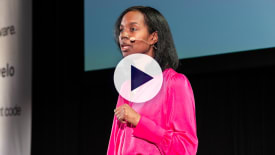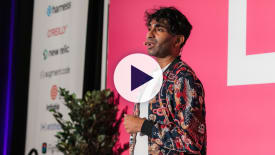
Latest videos
-

Leading leaders: Why your greatest strengths are your next blind spots
This talk challenges common assumptions and shares what it really takes to move from doing the work to enabling others to do it even better.
-

Uncovering silent struggles in leadership roles
A candid session revealing common hidden leadership challenges, with practical strategies to address and overcome them effectively.
-

The AI-augmented team: Rethinking roles, skills, and leadership
Explore how AI assistants and agents are reshaping team structures, required skills, and leadership in modern engineering organizations.
-

3 data-backed ideas to deter AI code quality problems
Learn what 250 million+ lines of code reveal about AI’s impact on code quality and how to address it.
-

Supply chain: Data infrastructure pipeline
Discover how modern data pipelines transform supply chains, enabling real-time insights, improving data quality, and optimizing logistics through advanced analytics.
-

Beyond the code: Leading engineering teams in the GenAI era
Explore how engineering leaders can guide teams through GenAI’s rise by focusing on the critical human work AI can’t replace.
-

No One Left Behind: Inside the Largest Domain Migration
A look at the industry’s most complex domain transfer, managed under pressure without losing a single team member.
Highlights from our conferences

Measure for Change
Picking metrics is one thing. But the harder decisions lie in what to do with them afterward.
View all videos from LeadDev London

Drive product gaps as an engineering leader
Discover practical strategies for engineering leaders to influence product development effectively, even in the absence of strong product management and a clear company vision.
view all videos from LeadDev NEW YORK

Growth in a downturn
In this talk, Smruti Patel asks, if hyper-growth is marked by spending more to make more, what does building for enduring growth look like?
view all videos from LeadDev berlin

Idea to Innovation
Join me as we embark on a journey to dissect the anatomy of innovation, uncover strategies to unlock the full potential of ideas, and transform them into impactful realities. Let’s build a strong culture of innovation, and make sure that it is not just a buzzword but a tangible outcome.
view all videos from staffplus london

Slack enterprise key management: Senior to staff lessons
Explore the key lessons and skills Audrei gained during their first Staff+ project, Slack Enterprise Key Management. This talk offers insights for anyone growing in their Staff+ career.
view all videos from staffplus NEW YORK
All videos
-

Navigating parental leave as a senior engineering leader
In this talk, Iccha covers what she did to prepare before her parental leave, from the perspective of business, and how to keep an org functioning healthy while you are out.
-

No more heroes: User experience design for incident response
In this talk, Plum discusses the “user experience design” of incident response processes that allow them to grow alongside a rapidly expanding team and technical landscape.
-

MMMRRRRR, or approaches to leadership and execution for staff+
In this talk, Joshua aim’s to answer the question “How should engineers think about the skills to sustain the expansion?”
-

Scale up: How to grow your team without growing headcount
In this talk, CJ Cenizal uses colorful AI-generated images to illustrate three stories about how he approaches this challenge.
-

Rise of the platform (Team)
In this talk, you’re going to learn what a platform team is, what they do, and why your business needs one.
-

What does an effective cloud strategy look like?
Hosting services on the cloud is the new normal. Learn how to use it effectively.
-

Building happy and effective data teams
Where do you start when building a data team, and how can you keep them motivated?
-

How to stand out and attract top talent in a candidate driven market
Recruitment strategies for your organisation to draw candidates searching for the perfect role and workplace
-

Building an engineering team that can withstand unexpected change
How can you plan for change and make sure your team feels secure in the face of uncertain times?
-

Ways your teams can (realistically) prioritize code quality
Code matters – learn how to create a culture of quality in your organisation
-

Enabling your engineers to run great interviews
Inconsistent interviewing standards can lead to wrong hiring decisions and costly mistakes
-

Five investments for a sustainable, high-performing team
How to build a healthy, self-sustaining ecosystem within your team that produces high-performing results.
-
Strengthening company alignment
As a senior leader, you are often the in-between person who is matching the business needs, product execution and the team’s talent. That work requires you to communicate proficiently to ensure everyone understands the needs and the status of progress. In this talk, we’ll cover the basic communication paths to be successful as a senior engineering leader and dive into two of the most difficult parts of it: forward planning and driving accountability in your teams.
-

Optimizing the time you and your team spend on hiring
Hiring engineers is intensive, so how can you streamline the hiring process and tap into top talent?
-
Common mistakes new staff engineers make… and how to avoid them
Understand how to navigate uncertainty and new challenges as a new staff engineer
-

Effective methods for developing peers and levelling up your mentorship skills
Coaching and mentoring play a crucial role in developing your peers’ potential
-

Career vectors for technical leaders
Mix and match skills to become the best technical leader that you can be.
-

Switch up how you manage up
Every senior leader you interact with will bring their own experience, set of biases, communication styles – and fundamentally, different personalities to a conversation. Lara Hogan explains how to adapt your tactics to different management techniques.
-

Unravelling the misconceptions of managing up
Senior Director of Engineering at Github Neha Batra unravels the misconceptions of managing up at LeadDev Together.
-

Managing compassionately through underperformance
You’ve identified that a person is underperforming. What comes next?



